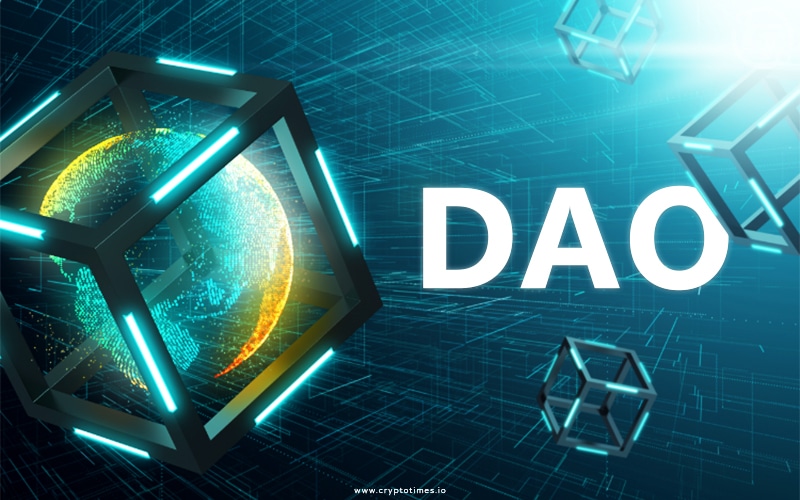DAO, which stands for “decentralized autonomous organization,” leverages “smart contracts” on a blockchain-based network to operate. They are decentralized, which means they are not controlled by a single entity, and autonomous, which means they may work without the assistance of a human.
The primary purpose to adopt DAOs is to create a decentralized world that is more reliable and trustworthy. Instead of depending on a single individual or group to guide the direction of the entity, a DAO gives every participant a voice, opportunity, and vote to propose initiatives.
DAOs have the ability to democratize decision-making, automate operations, and save costs for FinTech industries, businesses, and other groups, all of which add up to a lot of promise for these new systems. Cryptocurrency, particularly bitcoin trading, is a big help for DAOs because it provides the infrastructure for smart contracts and decentralized networks. In this article, you will get an idea of what DAO is and how it works. Let’s get started.
Bitcoin and Digital Ledger Technology (Blockchain)
Bitcoin, the world’s first and best-known cryptocurrency, was made by an unknown person or group of people using the name Satoshi Nakamoto in 2008. The blockchain, a decentralized ledger, records and verifies Bitcoin transactions. This is the currency’s most important technical achievement to date. A network of users, known as nodes, is in charge of maintaining the blockchain. These users work together to validate transactions and add them to the blockchain.
The blockchain is a public, distributed, and decentralized ledger that can record transactions in a way that can be checked is safe and can’t be changed. This technology has the potential to disrupt several industries. One of the most interesting ways blockchain technology could be used is to create operations that can run themselves.
DAO, at its core, is a blockchain-based community-led organization built by computer code and smart contracts. The DAO focuses on implementing a voting system to make important decisions or to make improvements about specific protocols or purposes. Basically, it acts independently of a central authority.
The DAO protocol runs on a decentralized governance mechanism. Note that, not all DAOs are created equal as different projects need different governance mechanisms.
If you are wondering how DAO operates, then here is the answer. DAOs work as a crowdsourced organization, where everyone can propose amendments which then proceed with external information and execute commands via a smart contract written for it.
Each participant of the DAO plays by the rules injected into the smart contract. In broader terms, the proposal requires the approval of the majority of DAO members to make or modify decisions. Every proposal raised in the DAO is finalized through voting.
The Opportunities Provided by DAOs
The following are some of the most significant and possibly helpful applications that DAOs present:
1. Decentralized Finance (DeFi)
They can be used to make decentralized financial platforms, like platforms for lending and borrowing, that run on the blockchain and aren’t run by a single company. This could make it easier for more people to get financial services while lowering the cost for borrowers and lenders.
2. Supply Chain Management
Making supply chain management systems based on blockchain technology that is transparent and works well. This has the ability to increase consumer and company trust while also cutting expenditures.
3. Decentralized social networks
These organizations can be used to build social networks that aren’t run by a single entity or person. It’s possible that this will make users’ data more private, give them more control over their data, and make censorship less likely.
4. Decentralized markets
Markets that use blockchain technology but are not run by a single company might provide more people with access to goods and services while also cutting costs for buyers and suppliers of such goods and services.
What Future holds for DAOs?
DAOs have a lot of promise since they are decentralized, self-governing, efficient, and open to public inspection than traditional organizations. Decentralized Autonomous Organizations (DAOs) benefit greatly from the use of cryptocurrency, specifically Bitcoin, as it serves as the foundation for smart contract functionality and decentralized networks.
DAO’s decentralized and secure nature has proven to be a good base for building autonomous organizations that don’t have a central point of control. Even though they have the potential to change a wide range of industries, it is important to keep in mind that there may be some problems and risks.
One of the key areas of concern is their lack of regulation and a legal framework, which may lead to legal uncertainty and misunderstanding. Furthermore, there is a need for a more user-friendly and accessible interface since the current setup may be too sophisticated and difficult for the average person to understand and deal with.
As time passes and our technical skills and knowledge of the environment improve, many businesses will likely start to leverage DAO. It will be fascinating to see how these organizations affect the future of business and society as a whole. Although it is impossible to anticipate what will happen with DAOs in the future, it is becoming clear that the growth prospects are promising.






